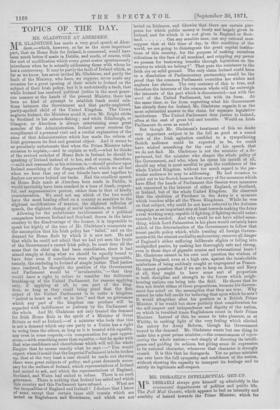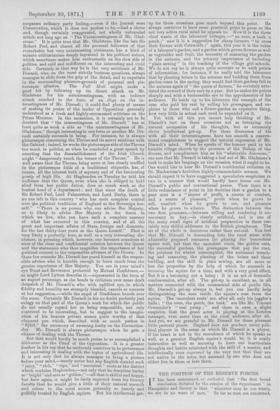MR. DISRAELI'S INTELLECTUAL GET-UP. ATR. DISRAELI always gets himself up
admirably in the .11.1_ ornamental departments of politics and public life. The Pall Mall Gazette, which appears to feel an intensity and acerbity of hatred towards the Prime Minister, which far surpasses ordinary party feeling,.--even if the journal were Conservative, which it does not profess to be,—had a clever and, though certainly exaggerated, not wholly unfounded article not long ago on " The Uninterestingness of Mr. Glad- stone." It is quite true that Mr. Gladstone, like the late Sir Robert Peel, and almost all the personal followers of that remarkable but very uninteresting statesman, has a kind of minute utilitarianism deeply ingrained in his political nature, which sometimes makes him enthusiastic on the slow side of politics, and cold and indifferent on the interesting and vivid side. Certainly in that way he is the very antithesis of Mr. Disraeli, who, on the most strictly business questions, always manages to slide from the grip of the detail, and to expatiate in the surrounding pleasure-grounds of personal and pic- turesque allusion. The Pall Mall might make a good hit by following up its direct attack on Mr. Gladstone for his uninterestingness, with an indirect attack couched in the form of an dive on the in- terestingness of Mr. Disraeli ; it could find plenty of means of making its praise of the leader of Opposition generally understood as a fresh and highly-envenomed criticism on the Prime Minister. In the meantime, it is certainly not to be doubted that " the interestingness of Mr. Disraeli " has at least quite as weak a side as the uninterestingness of Mr. Gladstone," though interesting in one form or another Mr. Dis- raeli certainly succeeds in being. For instance, he is always picturesque concerning the Throne and its secret relations' with the Cabinet ; indeed, he works the picturesque side of the Throne too much in politics, as when he concluded a great speech by asserting that the disestablishment of the Irish Church might " dangerously touch the tenure of the Throne." He is well aware that the Throne, being more or less closely muffled in the picturesque folds of a traditional etiquette, has, of course, all the interest both of mystery and of the fascinating gossip of high life. At Hughenden on Tuesday he told his audience that the Queen, even when she is obliged to hold aloof from her public duties, does as much work as the busiest head of a department ; and that since the death of Sir Robert Peel, Lord Palmerston, and Lord Derby, there is r;o one left in this country who has such complete control over the political traditions of England as the Sovereign her- self." " There is no person who can advise Her Majesty, or is likely to advise Her Majesty in the times in which we live, who can have such a complete mastery of what has occurred in this country, and of all the great and important affairs of State, foreign and domestic, or the last thirty-four years as the Queen herself." That is very likely a perfectly true, as well as a very interesting dis- olosure, in perusing which, however, one becomes conscious at once of the close and confidential relation between the Queen and the statesman who thus magnifies the importance of her political counsel to the responsible advisers of the Crown. In these few remarks Mr. Disraeli has posed himself as the respon- sible adviser who is humble enough to learn much from the greater experience of Her Majesty. You see in your mind's eye Trust and Reverence protected by Mutual Confidence,— so might Lord Lytton describe it,—represented in the form of an august personage, as she bends in criticism over some draft despatch of Mr. Disraeli's, who with uplifted eye, in which Fidelity and humility are strangely blended, cancels or corrects at her suggestion,—while the angel of Confidence broods over the room. Certainly Mr. Disraeli in his no doubt perfectly just eulogy on that part of the Queen's work for which the public do not usually regard her as being responsible, not only contrived to be interesting, but to suggest to the imagin- ation of his hearers private scenes quite worthy of that eloquent pen which, described with so much pathos in " Sybil," the ceremony of swearing fealty on the Coronation- day. Mr. Disraeli is always picturesque when be gets a ohance of dealing with the Throne.
But that would hardly be much praise to so accomplished a Etterateur as the Chief of the Opposition. It is a greater feather in his cap that he uniformly contrives to be picturesque and interesting in dealing with the topics of agricultural life. It is not only that he always manages to bring a picture before your mind,—surely never had any English district such " juicy," " rich," " ripe," and " succulent " roots as the district which contains Hughenden,—not only that he describes barley as "bright " and oats as "golden;"—all that is skilful and happy, but here again, it might be fairly expected from his literary faculty that he would give a little of their natural warmth and colour to the rural scenes generally so tamely and pallidly treated by English squires. But his intellectual get-
up for these occasions goes much beyond this point. He always contrives to have some practical point to press on the not very active rural mind he appeals to. Now it is the three chief wants of the labourers' cottages,—" an oven, a tank, a porch ;" now it is a suggestion for sheep farmers " to cross their Downs with Cotswolds ;" again, this year it is the value of a labourer's garden, and a garden which grows flowers as well as vegetables and fruit, the necessity of manuring the garden in the autumn, and the primary importance of including "plain sewing " in the teaching of the village girl-schools. We do not say he is always quite accurate as to such points of information ; for instance, if he really told the labourers that by planting briars in the autumn and budding them from garden-roses in the spring, they would find their gardens full in the autumn again of "the queen of flowers," he certainly ante- dated the reward of their care by a year. But he makes his points sharply and with a businesslike eye to the apprehension of his audience. He holds up to his labourers the example of the man who paid his rent by selling his greengages, and ex- plains to these who call a flower-garden an expensive thing, how very little in actual cash need bo expended on it. Yet with all this you cannot help thinking of Mr. Disraeli's tact on these occasions not as betraying the natural occupation of his thoughts, but as extremely
clever intellectual get-up. For these discourses of his with all their interestingness, have too smooth a conven- tional completeness to suggest the natural expression of Mr. Disraeli's mind. When he speaks of the honour paid to his humble village church by the presence of the Bishop of the diocese, and compliments him on his "admirable discourse," one sees that Mr. Disraeli is taking a leaf out of Mr. Gladstone's book to make his language on the occasion what it ought to be. One would like to hear Mr. Disraeli's confidential criticism on Dr. Mackarness's doubtless highly-commendable sermon, We should expect it to have suggested a speculative scepticism or two in a manner that would hardly have borne out Mr. Disraeli's public and conventional praise. Then there is a little redundance of point in his doctrine that a garden to a poor man is a " source of profit, a source of comfort, and a source of pleasure," profit when he grows to sell, comfort when he grows to eat, and pleasure when he grows to admire. The distinction between the two first processes,—between selling and rendering it un- necessary to buy,—is clearly artificial, and is one of the many small signs of artificial preparation in these cer- tainly very skilful addresses to the British ploughman. The air of the whole is dexterous rather than natural. You feel that Mr. Disraeli is descending into the rural scene with admirably prepared resources for playing the benevolent squire well, but that the succulent roots, the golden oats, the successful gardens, the greengages that pay the rent, the potatoes for winter consumption, the autumnal trench- ing and manuring, the planting of the briars and their budding, and the skill in plain sewing, are all more or less the properties by the help of which he succeeds in becoming the squire for a time, and with a very good effect, But it is a becoming, not a being ; it is an act of dramatic condescension, after all. The get-up is excellent, as, in all matters connected with the ornamental side of public life, Mr. Disraeli's get-up always is, but you can hardly help distinguishing the man inside the squire's coat from the squire. The 'succulent roots' are, after all, only his juggler's balls ; " the oven, the porch, the tank," are like Mr. Vincent Crummles's " real pump ; " and there is even a slight suspicion that the great actor is playing at the London manager, even more than at the rural audience, after all. And yet, we are grateful to Mr. Disraeli for these pleasant little pastoral pieces. England does not produce many poli- tical players in the sense in which Mr. Disraeli is a player. If his heart is not in the succulence of which he speaks so well, as a genuine English squire's would be, it is really instructive as well as amusing to have our inarticulate thoughts and habits mimicked with the skill of a master, and intellectually even improved by the very fact that they are not native to the actor, but assumed by one who does not either live in them or love them.































 Previous page
Previous page